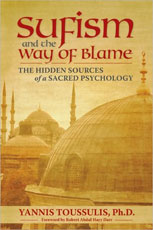Yannis Toussulis, a Western professor and practitioner of Sufism, has studied the Way of Blame for over a decade. This movement had its genesis in ninth-century Persia and was known for the practice of uncovering and working on one's egotism and its manifold offshoots. As the author shows in this scholarly work, the Way of Blame led to the creation of "Schools" and groups that made the practice their priority, thus earning the ire of Muslim literalists.
Toussulis covers a lot of territory after beginning with an overview of those in the West responsible for the idea of a "Sufi mystique" with "hidden masters," secret brotherhoods, and popularity among those in the "New Age" movement. On the question as to whether Sufis are either Islamic or universalists, Toussulis describes them as "a multiplex phenomenon that grew out of a syncretic cultural matrix, one that often embraced certain forms of Muslim heterodoxy. Notwithstanding these facts, one should not ignore that Sufism lacks unifying characteristics distinguishing it from other sacred traditions."
Next up is a critique of Idries Shah, Gurdjieff, and J. G. Bennet for their exaggerated emphasis on the universalist emphasis in Sufism. This is followed by a history of three different waves of the Way of Blame.
In order to give a glimpse of the sense of the movement in contemporary Turkey, Toussulis presents a 2009 interview with Mehmet Selim Ozic Bey who states: "The goal of a person on the Sufi path should be to attain a fuller self-awareness and maturity of self."
In sections on "The Seven Stages of Wisdom" and "Human Completeness," Toussulis zeroes in on the complicated stages Sufi psychology. In this context "The Way of Blame" provides a humbler approach to human self-awareness and the pursuit of a deeper relationship with the Divine.
